Peter MALONE
Saturday, 18 September 2021 19:48
Saint in London, The
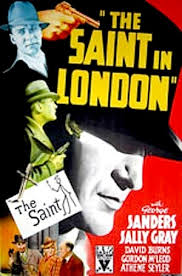
THE SAINT IN LONDON
UK, 1939, 72 minutes, Black and white.
George Sanders, Sally Gray, Henry Oscar, Ralph Truman, Athene Seyler, David Burns.
Directed by John Paddy Carstairs.
The Saint in London is the second Saint film with George Sanders. He is a very suave presence, a very British gentleman, able to pursue criminal investigations, this time in an alliance with the police and Scotland Yard.
The film was small budget, supporting feature, but entertaining nonetheless. Leslie Charteris had created the Saint and the Saint was to appear in many films with Sanders as well as Hugh Sinclair with television series, and star Roger Moore, in later decades.
Simon Templar has returned from the United States, and at a social meets Penny Parker (Sally Gray) as well as an odd character Bruno Lang (Henry Oscar). It emerges that he is the head of a gang which includes an international spy, the secretary at an embassy, and a man who owns a tobacco shop as well as some thugs. When they murder a Count, Templar is under suspicion but begins to work with Penny Parker as well as Detective Teal from Scotland Yard. At the beginning of the film he encounters a pickpocket and picks his pocket back! He is interested in his talent, his years in San Quentin, and hires him as an assistant. He participates in all the action.
With a London background, the film offers the character of Simon Templar, the interactions with Penny, the dependence on his assistant, secret collaboration with the police, all kinds of tactics including passing himself off as Detective Teal at the embassy.
There are guns, shootings, car chases… All in the style of the 1930s.
Published in Movie Reviews
Published in
Movie Reviews
Tagged under
Saturday, 18 September 2021 19:48
Pirates of Blood River, The
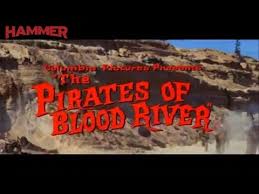
THE PIRATES OF BLOOD RIVER
UK, 1962, 87 minutes, Colour.
Kerwin Matthews, Glenn Corbett, Christopher Lee, Andrew Keir, Peter Arne, Oliver Reed.
Directed by John Gilling.
The Pirates of Blood River comes from the Hammer Studios after their initial success with horror films in the latter part of the 1950s including Dracula and the Curse of Frankenstein. Christopher Lee was one of their principal stars and appears here as the French-accented pirate chief, with his eye-patch, and his sinister presence (Christopher Lee at about age 40). The co-stars are Americans and American-accented. Kerwin Jonathons had made his mark as Sinbad. Oliver Reed can be seen in an initial role – which did not indicate his success and future career.
Huguenots had escaped from France and persecution to an island off the coast and had set up a prosperous colony, although the leaders had become far more strict and God-fearing as the years went on. Inhabitants were rebelling. This is especially the case at the opening when the hero has a rendezvous with the wife of one of the elders. She tries to escape, into the river which turns to blood, the suggestion there were Piranha-like creatures – who also destroy the pirates of the end. In the meantime, the hero is sent to a penal colony. When he escapes he discovers a pirate community at the other end of the island, led by Christopher Lee, and intent on finding treasure.
This builds up to the confrontation between pirates and colonists with the expected results. Hammer Studios also produced another pirate movie at this time, Devil- Ship Pirates.
1. A 1960s pirate film, though the action taking place on land? An action adventure?
2. Hammer films and the tradition of horror, this variation on their subjects, yet their cast including Christopher Lee?
3. The film shot in the UK, the island off the coast, the refuge for Huguenots, the colony and its history, the initial information, religious freedom, but tyrannical society, the leaders, the Ten Commandments, invocation of God?
4. The introduction to Jonathon and Margaret? The others, pursued? Court? Margaret escaping, her death in the river, the blood in the river? Jonathon’s arrest, his appeal to his father, his criticism of Margaret’s husband and his cruelty, the trial, his condemnation, his father’s bearing him death? to be sent to the penal colony?
5. Jonathon, Bess and her plea, Henry as his friend? The time in the colony, the hard work, the cruelty, the deprivations? With the old man, the carriage, the rocks, the guard falling to his death, the escape, the dogs pursuing, the old man collapsing, Jonathon’s escaping through the water?
6. The pirate colony, its origins, the leader and his French accent? His character, eye-patch? His control of the men? Hatch as his assistant? The other men and their brutality? The interest in the settler’s colony, presuming they had treasure?
7. Jonathon, in the colony, recovering, his agreement with the leader, the approach to the colony, the boy seeing him and reporting what had happened? The attack on the women, the death of the father?
8. The leader, his presumptions about treasure, the confrontation with the leaders? The gun battle? Going into the hall, the statue of the founder?
9. Jonathon, his escape, trying to help? His being taken? The gathering of the people, the execution of two of the men? The threats? The brawling pirates and their blindfold, fighting over the Bess?
10. Jonathon and Henry working together, the build-up to the confrontation, the fight, Jonathon and the leader and the sword fight? The leader being killed? The pirates killed in the river – and the blood?
11. Ridding the colony of the pirates, the new beginning?
12. An interesting variation on popular pirate stories – though some considered it to landlocked!
Published in Movie Reviews
Published in
Movie Reviews
Tagged under
Saturday, 18 September 2021 19:48
Sir Billi
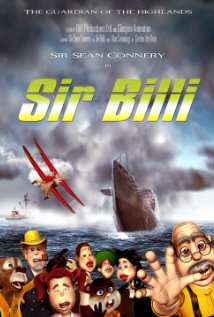
SIR BILLI
Scotland, 2013, 75 minutes, Colour .
Voices of: Sean Connery, Alan Cumming, Ruby Wax, Miriam Margolyes.
Directed by Sascha Hartmann.
Sir Billi is considered the first Scottish animation film, Glasgow animation. It was made under the auspices of Sean Connery.
However, it is standard animation, and a standard storyline which will appeal only to the littlies. And that will depend on how they pick up the Scottish accents.
The story is quite simple, two police are taking beavers in captivity to send them to Norway because they are a pest in Scotland. Despite all the chatter and precautions, the truck driver with the cages has a crash – and one beaver escapes.
The action moves to 5 years later. Sir Billi is an old veterinarian, sounding like Sean Connery. He has an associate, Gordon (voiced by Alan Cumming), a goat who thinks he is a dog. Sir Billi also has a daughter living in a manor whose little son has to get to school. Sir Billi picks him up and they soon become involved in all kinds of adventures, including the American cousin of a local woman bringing glamour to the town. The comedy comes in the conversations between Sir Billi and Gordon, old friends sparring.
When some animals fall over a cliff and are hanging on to a log, everybody comes to their rescue including Sir Billi and Gordon.
There are some other eccentric characters in the film including the policeman who lost the badgers in the first place and is continuing his search as well as an admiral who does not take well to water.
The film takes its place as part of Scottish film history but its audience will be limited to those who are very young.
Published in Movie Reviews
Published in
Movie Reviews
Tagged under
Saturday, 18 September 2021 19:48
Get Lucky
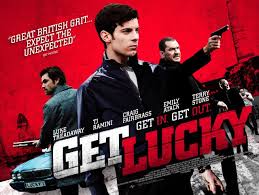
GET LUCKY
UK, 2013, 86 minutes, Colour.
Luke Treadaway, Emily Attack, Craig Fairbrass, T.J.Ramini, James Cosmo.
Directed by Sasha Bennett.
Get Lucky is one of the many, many British gangster films produced at the end of the 20th century and into the 21st century. It is not one of the better ones. However, it passes the time with its portrait of London criminals and their activities – and some comeuppance.
The film was written and produced by its star, T.J.Ramini, who portrays Raphael. The star of the film is Luke Treadaway, who with his twin brother, Harry, has appeared in a number of specialist British films.
The regular ingredients are present, the young man returning to London after hiding, reuniting with his brother and his friends, falling foul of an Eastern European gang presided over by James Cosmo, with his sadistic nephew and his partner. There is a casino robbery, with complex motivations and revenge. And there is an attractive blonde who teams up with Treadaway, is married to the sadistic nephew, and turns out to be, in her terms “a bad girl”.
Routine and nothing special.
1. The popularity of British gangster films? The influence of Guy Ritchie and Lock, Stock and Two Smoking Barrels?
2. The London settings, clubs and casinos, warehouses, flats and houses? Realistic? Musical score?
3. The title? With reference to Lucky? With references to all the activities and luck on the side of the two brothers? Ironic?
4. The focus on Lucky, his return, the initial abduction, turning out to be a joke, reunited with Raphael and his friends? His reason for being away? The burning of the money? Tangled with the criminals, Sebastian and Kramer and their killing his friend, attacking him? The meeting with Bridget, falling in love, the affair? His discovery that she was married to the nephew? His agreement to help with the casino heist? Driving the car, the pickup? Success? Dividing the money, the bonds? The complexities with the bonds, hiding them, the criminals discovering them? The build-up to the shootout, Raphael, Sebastien and Kramer, the nephew, Bridget killing him? And her taking all the money and bonds? Lucky by name, not by good fortune?
5. Raphael, like his brother, his colleagues, the death of the parents, the need for revenge, the planning of the casino robbery, old-style, Tommy guns, the execution of the robbery, the shootings, the boat in the pursuit, Lucky picking them up, dividing the money, the attack, Raphael being shot, surviving?
6. The boss, Eastern Europe, his personality, domination, Sebastian and Kramer, his nephew and Eli, with the women? Wanting his money back after its being robbed from the safe? The robbing of his casino, losing face? The betrayal by the Marilyn Monroe lookalike?
7. The boss’s nephew, personality, with Bridget, with Eli, anger, brutality, agreeing to participate in the robbery, not knowing that it was his uncle’s casino, the brutality towards Bridget, pursuing Luke and Raphael, the shootout and Bridget killing him? Eli, partner, the girl like Marilyn Monroe, the betrayal, the boss and his executing him?
8. Sebastian and Kramer, thugs, torture, Kramer and his anger, anger management, count to ten? Their pursuit of the robbers on the river? Shootouts and
death?
9. Bridget, at the bar, the attractive blonde, leading Lucky on, the affair, her husband, helping at the end, shooting her husband, taking the money and
going?
10. Popular ingredients for this kind of low-budget British gangster film?
Published in Movie Reviews
Published in
Movie Reviews
Tagged under
Saturday, 18 September 2021 19:48
Filth
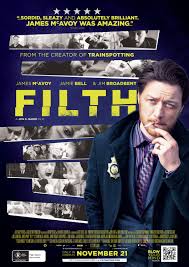
FILTH
UK, 2013, 97 minutes, Colour.
James Mc Avoy, Imogen Poots, Jamie Bell, Gary Lewis, Jim Broadbent, Shirley Henderson.
Directed by Jon S. Baird.
Filth is not the most attractive title for a film – and audiences seeking it out will not be too disappointed. Audiences who find themselves watching Filth may well be put off by the character at the centre of this film, his behaviour, his generally unredeemed qualities.
The film is based on a novel by Irving Welsh, well-known as an author as well as for the film version of his Trainspotting, 1996, a story of Edinburgh and the drug culture, directed by Danny Boyle. There was a version of his novel, Ecstasy, in 2011, a film about drugs and clubbing which did not make the same impact as Trainspotting. Filth goes a long way to living up to Trainspotting’s impact and reputation.
It comes as something of a surprise to find that the central character is a detective in Edinburgh. The film opens with a racist murder and the police mobilising to investigate. The audience sees who the killers are, a gang of would-be toughs in the city, but the mechanics of the investigation are left in the background of the film. James Mc Avoy’s character, Bruce, begins a narration. Some of it is realistic, some of it is fantasy. The image of his wife (who may or may not be around) and her sexuality continues to enter his consciousness. He also suffers from depression, is drug-addicted and seems, at times, to have a sexual addiction. To that extent, his life is filthy.
What he is up to is to get himself promoted and he introduces us to each of the rivals in the office, mainly men, one woman. For a considerable part of the time we see him bad-mouthing, undermining the reputation of the various candidates. One of them is on his side, a young hopeful, but also with drug and sex problems, played by Jamie Bell. Another is quite a good natured, rather unsuspicious policeman played by Gary Lewis (who was Jamie Bell’s father in Billy Elliot). There is also another man from the office, with Bruce having an affair with his wife behind his back. And, to him, the efficient female police officer, Amanda (Imogen Poots) is hardly worth consideration. Another man in the office is gay and Bruce capitalises on this to undermine his reputation. So, not an attractive scenario for us to be participants in.
As Bruce goes about his work, stopping off to his various indulgences, he also has interviews with a psychologist, played with an insinuating and teasing voice by Jim Broadbent. Sometimes hard to tell whether that interviews are real or in Bruce’s imagination.
Bruce also has another victim, Bladesey, who is part of the Freemason brotherhood that the police chief belongs to as does Bruce, a pressure group for the management of law and order in the city. Bruce has some time off and takes Bladesey to Hamburg and leads him on a series of sexual adventures which have a bad effect on Bladesey and he finds himself in prison when back at home and accused of being a pervert. Meanwhile, Bruce has set up a liaison with Bladesey’s wife (Shirley Henderson).
This makes it sound something of a wallow in some misery and filth and psychological disturbance. And it is. What makes it different from other similar stories is the intensity of the performances, the realism and surrealism of the writing as well as many experimental-style techniques in communicating Bruce’s consciousness.
One might say this is a very clever film, as an appeal for audiences interested in the offbeat, but may well be a turn-off for a lot of audiences who prefer their films as portraying humanity rather than a self-inflicted inhumanity.
1. The title, human nature, Bruce and his life?
2. The work of Irvine Welsh, his novels, film adaptations?
3. Scottish story, Edinburgh, the opening, the explanation, the images? Edinburgh and the streets, the police station, flats and homes? The excursion to Hamburg?
4. The range of songs, lyrics, the comment on characters and action?
5. The initial murder, the Japanese student, walking along the underpass, the thugs, the beating? The woman walking along the path, Carol – or Bruce in drag? This aspect real or hallucinatory? The investigation? The captain, his team, Bruce and Amanda, the audience not seeing much of the investigation, knowing who the killers were? The newspapers and the focus on the victim?
6. The drugs, the dealers, cash, the clubs, Bruce and drugs, Ray and drugs, the effect?
7. Sexual preoccupation, Bruce, Carol and her dress, teasing? Chrissie? Bunty? Masturbation, pornography? The Christmas episode in the office and the photocopies? Measurements in size? Hamburg, the prostitutes? Sex and violence? The role of wives, affairs, leaving?
8. Homosexuality, Peter, partners, clubs, talk, Hamburg, the club in the visitor, Peter put it in difficult situations, the graffiti in the toilet? The boss and the discussions about him?
9. Animation, reality, animal heads, credibility?
10. The portrait of Bruce, confiding in the audience, looking at the audience, the street and the bagpipes? His ambitions, describing all his colleagues, downgrading them, undermining them, the visuals, manipulation and destruction, sex, drugs, graffiti, backstabbing? His own personal disintegration, Carol absent, drugs and hallucination, Clifford, sex and pills, Bladesey and his calling him a pervert, in prison, despising people? The women, his collapse? Ambulance, wife and scarf?
11. Carol, her teasing, Chrissie and the affair, her husband, Bunty and her husband? Liking women? Misogyny?
12. In the office, the boss, discussions, the Freemasons meeting, the influence of the Freemasons, Bladesey and the brotherhood, expectations of Bruce? Amanda, her help, his despising her? Ray as his friend? Peters victim? Using people’s wives?
13. His continual talk about the promotion? Manoeuvres?
14. The interviews with the psychiatrist, real or surreal, the pills?
15. Audiences sharing Bruce’s experiences, depression, self-image, self-loathing, destroying others, exploiting people, drugs, sex, psychological disintegration?
Published in Movie Reviews
Published in
Movie Reviews
Tagged under
Saturday, 18 September 2021 19:48
Philomena
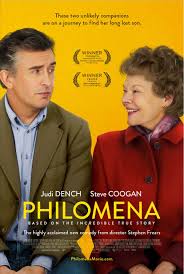
PHILOMENA
UK, 2013, 97 minutes, Colour.
Judi Dench, Steve Coogan, Anna Maxwell Martin, Barbara Jefford, Ruth Mc Cabe, Mare Winningham.
Directed by Stephen Frears.
Philomena is a good old-fashioned Catholic name, a bit like Christopher, names which derive from saints whose authenticity was questioned. So, Philomena is an apt name for the central character evoking a past Catholic Church, a strong and triumphant Church, which is now shaming so many Catholics around the world. This film has subject material that has been brought up in many government enquiries, particularly in Ireland where the key action of this film takes place. The fate of unmarried and pregnant young women in Ireland was often a kind of internment in institutions run by sisters, using the young women as Magdalenes in their laundries. Films which dramatised these situations include The Magdalene Sisters and the telemovie, Sinners.
Some reviewers have raised the question as to whether this film is an attack on the Catholic church, especially the reviewer of the New York Daily Post.
An atheist movie reviewer has criticized the new film “Philomena” as “another hateful and boring attack on Catholics,” saying that it unfairly shows the Church as exploitative and coercive.
“Anyone who is honest understands that it lambastes the way Irish Catholicism played out in 1950s Ireland, using falsehoods whenever necessary to underscore the point,” said Kyle Smith, a movie critic for the New York Post.
“Some like ‘Philomena’ for that reason. Some think there should be a little more art than diatribe to a film,” he continued.
… “a witless bore,” “90 minutes of organized hate,” and “a diabolical-Catholics film, straight-up.”
This is a reminder that the Catholic Church has been criticised in a number of films, especially in the context of clerical sexual abuse. Catholics are being asked to examine the conscience of the Church and acknowledge more sinfulness than they might have imagined in years gone by. Whatever the stance of Philomena, it contributes to this examination of conscience.
The challenge of the film will be more extensive than others since it stars the ever-popular Judi Dench as Philomena and she gives one of her best performances, already nominated for awards. Philomena is getting widespread distribution.
Older Catholics, especially in English-speaking countries, could recount similar stories to those in the film: harsh attitudes towards these young women, severe and authoritarian behaviour of nuns and clergy. But, so many Catholics, while decrying this behaviour, remained steadfast in their faith – as does Philomena Lee, the actual subject of the film. She wrote a letter to Kyle Smith criticising his review and professing her faith.
The US Catholic News Service reviewer, John Mulderig, takes a more balanced approach in considering the Church issues:
… properly viewed, "Philomena" may serve to illustrate the dangers that can result when appreciation for the virtue of chastity degenerates into puritanical repression — and when objective moral truths are misused as judgmental bludgeons.
With the exception of one seemingly temporary crisis, moreover, Philomena herself is shown to cling tenaciously to the very faith by whose representatives she was so cruelly mistreated. In fact, her Gospel-based beliefs help to set up the contrast in personalities between the two leads on which much of the movie's drama — as well as many of its interludes of much-needed comic relief — turn.
Throughout their interaction, Philomena's religiously inspired enthusiasm for life, friendliness toward others and willingness to forgive are shown to be in stark opposition to Sixsmith's jaded, isolating air of condescension.
Mulderig makes the important point:Even so, the challenging material on offer here, including a conflicted but not fundamentally hostile outlook on faith.
And the film itself.
It was written by Steve Coogan, best known as a comic performer and writer, himself an ex-Catholic portraying journalist, Labour government adviser, Martin Sixsmith (also ex-Catholic), who worked with Philomena Lee in the search for the son who was suddenly taken from her when he was about six. While Coogan has written all the anti-Catholic comments in the film and Sixsmith demands an apology from Sister Hildegarde, morally intransigent in her attitudes towards the young women, declaring that they deserve their pain and suffering for their immoral behaviour, Coogan has devoted his energies to this story. (There is dramatic licence here since the actual Sister Hildegarde was dead.)
Audiences can forget that it was Coogan who also wrote the faith statements of Philomena as well as her criticisms of Sixsmith’s anger and seeming bitterness.
Judi Dench perfectly embodies Philomena, now elderly, a former nurse, who signed a document of silence about what happened to her and her son. She is a simple woman, not so quick on jokes, loves to recount the plots of Mills and Boons type novels. Martin Sixsmith decides to investigate where the boy might have been taken – which leads to the US.
The search is a blend of hope and disappointment, finally reaching a sad solution, once again highlighting the cruel decisions of the sisters concerning concealing information from Philomena and her son.
While the performances are powerful and the subject so serious, there is a great deal of humour (like the bit in the trailer where Philomena refuses a drink on British Airways, Martin telling her that it is free and she relenting, remarking that you have to pay for everything on Ryanair).
The director is the prolific Stephen Frears, a master of all kinds of genre. His other film with Catholic themes is Liam, a story of Catholics in Liverpool in the 1930s, written by Jimmy McGovern?.
Both Liam, in 2000, and Philomena, 2013, won the SIGNIS (World Catholic Association for Communication) award at the Venice Film Festival.
1. A true life story? Human interest story? A critique of the treatment of children? Ireland?
2. The awards and acclaim?
3. Judi Dench, Steve Coogan, their screen presence, Steve Coogan and his co-writing the script? The adaptation of Philomena Lee’s book? The story of Martin Sixsmith?
4. The introduction to the film via Martin Sixsmith, his role in the Labour Party and the actual television footage of his sacking, going to the psychologist, depressed, going to the party, meeting the editor, her showing interest? The issue of human interest storyies? Philomena’s daughter working, overhearing, Martin’s refusal, asking his wife’s advice, tracking down the daughter, setting up the meeting with Philomena?
5. Meeting Philomena, her age, Irish background, the flashbacks to her as young, at the fair, meeting the boy, the sexual encounter and her later explanation of enjoying it, yet her sense of shame, sense of sin? The pregnancy, the family sending her to Roscrea? Her life there, the difficulties of the birth, the breach birth, no help, the nuns present, one helping, the others and the attitude that these girls deserved the pain? Pain as a penance? Philomena’s life, the hard work in the laundry, all week, her friendship with her co-worker and her daughter? The children playing together? The mothers having access to their children one hour per day? The disappearance of her friend’s daughter? Her watching Anthony going in the car, at the gate? The buyers, coming from America, the fee paid? Philomena sad, leaving, signing a document of secrecy, thinking about her son every day?
6. Philomena, her work is a nurse, her strong relationship with her daughter, the photo of her son, the daughter finding it, her revealing of the truth, the daughter’s concern, the approach to Martin Sixsmith?
7. The situation, the Magdalene communities, Ireland in the 1950s, harsh society, families and their harsh decisions? The institutions, the nuns, the ethos of nuns at the time, strict? The girls in servitude, humiliated, not allowed to speak about their situation? The kind nun getting the photo for Philomena, the only record of her son?
8. The changing Church, Philomena and Martin visiting, the African sister, not wearing a habit, Sister Clare and the welcome, the discussions, Sister Clare’s resistance to Martin as a journalist, as an ex-Catholic? The denials? The very the later revelation of the son’s visit to Roscrea, their not telling him anything about his mother, his being buried in the cemetery? The first visit to the cemetery and it’s being overgrown, Martin’s criticism to the sisters? The last visit?
9. Sister Hildegarde symbolising the nuns, her role in the past, later at her great age, challenged by Martin after following her, her impassioned speech about herself, her fidelity to her vows, the women meriting what they suffered? Philomena forgiving her? Martin unable to forgive her?
10. Martin and Philomena, her lack of a sense of humour and picking up the jokes, plain talk, a love for Mills and Boon type stories and the long accounting of the story to Martin and his reaction? Her wanting to watch Big Momma’s House and saying it looked hilarious, the end of the film and her recounting another Mills and Boon novel?
11. The life effect on Philomena, her sadness, her memories of the Magdalen work, the memories of leaving, the visits to the convent, the story of the fire, the loss of the documents, yet her document acknowledging secrecy survived? Yet her continued faith, going to the church to pray, speaking about her faith and not being bitter?
12. Martin, his research, information from America, information about the American couples coming and giving money for the babies, Jane Russell’s photo? Documents and research, working on the date of birth for Anthony to discover if he was still alive? In America?
13. The decision to go to the United States, Philomena’s resistance, yet her going, the comedy on the plane, having the drink and commenting on Ryanair and paying for everything? In Washington, going to the Lincoln Memorial? The building up of the contacts? Her comments about obesity and her concern about what might have happened to Anthony?
14. Martin, his journalist and political contacts, his being seen in the photo with Anthony, his change of his name to Michael? His career, advising the Reagan Administration, Bush administration? The revelation that he was gay, Philomena immediately accepting this, the dungarees? The visit to the sister, the story of the parents, harsh, no talk about Ireland, seeing the home movies and the scenes recurring throughout the film? Philomena wanting to know what her son had said to Martin: hello?
15. Martin and his contacts with the editor? Her hard attitudes and wanting the tough stories?
16. The visit to Peter, the gay partner, tracking him down, the address, travelling, Martin trying to doorstop him, Philomena knocking on the door, going in, talking, learning about Michael’s life with Peter, HIV, her getting a picture of her son and his talk about Ireland?
17. Michael and his love of Ireland, going to Roscrea, not getting any information about his mother, his being buried there?
18. Philomena and Michael returning, the sisters, Sister Clare, the truth, Sister Hildegarde, forgiveness, Philomena accusing Martin of being too angry and unforgiving, it’s ruining his life? The visit to the cemetery?
19. A moving film, a critique with heart, humour, forgiveness, acknowledgement of the harsh realities of church life?
Published in Movie Reviews
Published in
Movie Reviews
Tagged under
Saturday, 18 September 2021 19:48
Tosca's Kiss
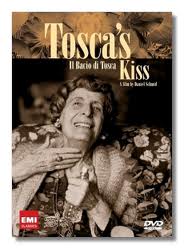
TOSCA'S KISS
Switzerland, 1984, 87 minutes, Colour.
Directed by Daniel Schmid.
Tosca's Kiss is a popular and engaging documentary about a home for ageing singers and musicians in Milan. It is sponsored and run by the Giuseppe Verdi Foundation. After the expiry of Verdi's copyright rights, financial difficulties dogged the running of the home. This film contributed to funds for further management.
The film was made by Swiss director Daniel Schmid, director of such features as Hecate. The film begins with the facade of the home in Milan and ends with the cameras drawing away from it. The audience has visited the home and met the people inside with the director.
The film is a pleasing story about old age. The inhabitants are like any people that one would meet in a home for the aged. They are old, they show signs of age. They are humorous, silly, petty, have great dignity. They also, as the nurse says, live in the past. This is particidlarly the case with the inhabitants of the Casa Verdi. They are retired opera singers, musicians, conductors. The film shows several of them in detail. They look to the camera, speak, sing. Some are shrewd and play to the camera. Others do not realise how they communicate - and are authentic even in their pomposity. This is particularly the case of one singer who talks over his American-born wife all the time. Several of the men have extraordinarily fine voices and enjoy singing. One opera star is given central treatment. There is a pleasing scene where she listens to one of her old records of Tosca.
There are many operatic excerpts sung by the old singers. They sing alone, as they move around the home, they are gathered together by a celebrated conductor and sing with great vigour together. Their finale is '0 Sole Mio'
The film is Italian in style, in Italian dialogue to capture the nuances and tones of the elderly people. The film invites the audience to reflect on achievement, ageing, memories of past glories, human foibles.
The film is an entertaining and humane cinema document.
Published in Movie Reviews
Published in
Movie Reviews
Tagged under
Saturday, 18 September 2021 19:48
Zoolander
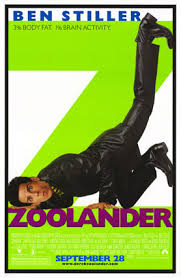
ZOOLANDER
US, 2001, 95 minutes, Colour.
Ben Stiller, Owen Wilson, Will Ferrell, Jerry Stiller, Jon Voigt, Vince Vaughn, Christine Taylor, Milla Jovovich, David Duchovny, Alexander Skaarsgaard.
Directed by Ben Stiller.
Zoolander is the work of Ben Stiller. He contributed to the storyline, to the screenplay, directed the film and starred. At this point of his career, he had appeared in a number of comedies, several with Owen Wilson (Starsky and Hutch). He had also directed a number of films including Reality Bites and The Cable Guy. He was to continue in this vein for many years with such films as The Heartbreak Kid, Pineapple Express and received acclaim for his re-make of The Secret Life of Walter Mitty.
This film is a strong and entertaining spoof. It takes on the world of fashion, sending up the style of clothes, parodies of advertisements, the serious self-image of the models (and their sometimes being dumb). Stiller captures this perfectly with his impersonation of Derek Zoolander, rather ignorant, from a mining background (with Jon Voigt as his miner father and Vince Vaughn as his brother), achieving a great deal of success, being managed by a shrewd agent, Jerry Stiller (Ben Stiller’s father – and his mother, Anne Meara, appears in the scene where she throws something at the models). Matilda, the journalist, is played by Stiller’s own wife, Christine Taylor.
The film is also strong with Owen Wilson and his performance as the rival model, Hansel, dashing, especially in a collage of his career, but also dumb. Will Ferrell is the villain, the designer who wants to perpetuate cheap production in the sweatshops of Malaysia and plans the assassination of a rival who will close them down.
A huge number of guest stars as themselves pop in and out of the film, with Billy Zane having a more prominent position in setting up the competition between Derek and Hansel and David Bowie appearing as the referee. Alert audiences will see Natalie Portman, Winona Ryder, Stephen Dorf, Christian Slater, Donald Trump…
A sequel has been promised for many years, and if Ron Burgundy can have a sequel, why not Zoolander?
1. The film’s strong reputation? American comedy? The style popularised by Ben Stiller, Owen Wilson, Will Ferrell, Jerry Stiller and their careers? The more serious side with Jon Voigt?
2. The American fashion world, the send-up, spoof? The models, the designers, the fashion shows, the advertisements? The adulation of the fans?
3. The range of popular songs and esoteric inclusion: I started a joke…, Before you go-go…?
4. Social concern, the sweatshops of Asia, Asia itself, the reference to Malaysia, the dictators, the US companies and their exploitation?
5. Ben Stiller, his part in the script, directing, starring? Zoolander and his career, his awards, the Blue Steel Look, the working on the Magnum Look for so many years? Not bright? Mixing his words like eulogy, mixing up sayings? Kids who don’t read good…?
6. The catwalk, the advertisements, television coverage, Matilda and her interviews, the newspaper articles and headlines, making and destroying
careers? His work with his agent, Balls, his agent doing the dirty behind his back, in league with Mugatu?
7. Mugatu not employing him, his getting ready for the award session, clothes, make-up, the competition, the character of Hansel, his becoming a success, the collage of his modelling, clothes, interviews? Derek at the table, the announcing of the winner, his expectations, his going up, oblivious of what happened, Hansel’s reaction, his shame, the television mockery and the newspapers?
8. Mugatu, the interview in Malaysia, the plot, assassination, search for the dumb model, working with Balls, choosing Derek, especially after his defeat? The proposition about Derelicte? His being taken, Katinka Ingabogovinonana and her tough stances, dangers, Christine finding she was present at the murder of the other models? The thugs? The plan, the show with all the derelicts and their clothes and fashions? Mugatu in himself, inventing the tie, his reputation?
9. Matilda, her personality, the interviews with Derek, his ignoring her, the story, his being offended? Her working at the office, her researcher and finding out the information about Mugatu? being with Derek, the puzzle, wanting to help, falling in love, working out that the song Relax was the trigger? The phone calls from Pruitt? Meeting him, the visit to the cemetery and the dead models? His being killed?
10. Derek, with Katinka Ingabogovinonana, the brainwashing session, the recording, his repeating the words, practising to be an assassin?
11. Hansel, his winning, sneering at Derek, the clash, the feud and the competition at the catwalk? the discussions, change of attitude, Derek going to Hansel’s apartment, the people there? Hansel and his decision to help, working at the disguise – in blackface? Searching for the files in the computer and smashing it? Rather dumb like Derek? Derek and his friends trying to raise money, the dumb friends, the petrol fight at the station, the explosion – the latest actual of them with the pumps in his institute?
12. Derek, his dismay at his defeat, going home, meeting’s father and brothers, their working in the mine, his wanting to do work in the mine, coming down, the fashion, all the effort for small results and lifting coal, his hammer flying off, thinking he had disease? In the bar, trying to talk to his father, the sneers of his brother? His father disowning him? The irony of his father watching the television, dismayed at his son being a model, his saving the president of Malaysia and his father being proud of him?
13. The fashion show, the president as guest, his sitting and watching, on the catwalk, Matilda and the record, her struggle with Katinka Ingabogovinonana, breaking Derek’s fixation? The throwing of the weapon, Mugatu being desperate, Derek holding it in preventing the killing?
14. Derek’s good intentions, the school for kids who don’t read good, Mugatu and the temptation with the institution, the model and Derek thinking it was the real thing? His concerned about the sweatshops?
15. The end, the establishment of the Institute, Hansel and his being a tutor, Balls and his instructions about money deals, Matilda and the baby son and his hair and Derek look?
16. A popular and entertaining comedy and satire?
Published in Movie Reviews
Published in
Movie Reviews
Tagged under
Saturday, 18 September 2021 19:48
Lay the Favorite
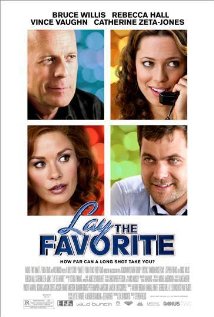
LAY THE FAVOURITE
US, 2012, 90 minutes, Colour.
Bruce Willis, Rebecca Miller Hall, Catherine Zeta- Jones, Vinvr Vsughn, John Carroll Lynch.
Directed by Stephen Frears.
Lay the Favourite is a comic drama based on an autobiographical book by the central character, Beth. Critics and bloggers were not impressed by the film at all, dismissing it as confused and unfunny. Even audiences who like the film may be very well surprised to find that it is directed by Stephen Frears, whose over 40 years career is marked by an extraordinary diversity of films and film styles, from My Beautiful Launderette to Dangerous Liaisons, from The Grifters to Liam, from Mrs Henderson Presents to Philomena.
Beth presents a very bad impression at the beginning, a would-be stripper for private clients, absolutely ditzy in her speech and manner, deciding to go to Las Vegas to be a cocktail waitress. Las Vegas is a union town and she is not likely to get a job but is referred to Dink, Bruce Willis, who runs a betting agency. She becomes a bit more serious, shows that she is shrewder than we first thought, has a way with numbers on memory.
Many complications arise, including Bruce Willis having a wilful wife, Catherine Zeta-Jones?, who at first makes things difficult for Beth but soon they become good friends. Another complication is Beth falling for a journalist, Jeremy,.And then there is Vince Vaughn as another betting manager, far too carefree and careless in his work, even when Beth goes to assist him. John Carroll Lynch appears as a difficult client and all the attention of the group is focused on him, to intimidate him, to make some money, to save reputations – except that of Rosie, Vince Vaughn.
It is presumed that they live happily ever after, but we soon forget them except perhaps Rebecca Miller, an intelligent actress who often portrays intelligent characters, being absolutely ditzy.
1. A film about gambling? Winners and losers? The upbeat tone and ending?
2. The extensive negative critiques? Expectations of audiences for this film?
3. The title, gambling, the explanation?
4. The film based on a memoir, a true story, Beth’s story, comic and serious?
5. The introduction, Beth and her stripping, her clients and their reactions, the man with the gun, her fear? her parents not knowing her job? Going to her father, the discussions, the decision to be a cocktail waitress in Las Vegas?
6. Her journey cross-country, arriving in Las Vegas, her excitement, naive, going to the casino, playing the game that was for those unable to play proper games, the union rules in Las Vegas for employment? Going to the motel, meeting the girls, sunbaking, chatting, their talking about Dink, getting a life? A character, ditzy, her clothes, her silly reactions, her skill in numbers, illustrating her memory to Dink, growing shrewdness?
7. Meeting Dink, Bruce Willis, the discussions, his firm, his office, the explanations of how the betting worked, the television monitors, his controlling the bets and the percentages? His two assistants? His hiring Beth? A reaction? The work, the first phone call, her success? Getting on well with people?
8. Dink, tolerant, his business, associates, his style and work? His being attracted to Beth?
9. His wife, going on the cruise, the return, seeing Beth, antagonistic? Her having a facelift? Meeting Beth, talking, their becoming friends? Dink and his being faithful?
10. Rosie, his manner, arrival, his style, the laws in New York and in Nevada, gambling offshore? Online? Phones? His plans, celebrations and parties, with the girls? His clients? Beth the attraction? Her leaving Dink, his abrupt firing her, and going to work for Rosie?
11. Meeting Jeremy, their talking, his work, the attraction, sharing?
12. Beth and Rosie dealing with the client, getting information about him, his escape, Jeremy getting the information, Dink and his wife and Beth all going in pursuit of him, the phone call, the plan?
13. The confrontation on the phone, the client at his bluff, Beth and her bluff, bravado, the deals, the threats, his consenting? The money deal?
14. Rosie, his style, overreaching himself, failing?
15. The happy ending, Dink and his wife, Beth and Jeremy, a happy gamble?
Published in Movie Reviews
Published in
Movie Reviews
Tagged under
Saturday, 18 September 2021 19:48
Jacob's Ladder
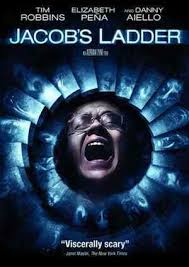
JACOB’S LADDER
US, 1990, 113 minutes, Colour.
Tim Robbins, Elizabeth Peña, Danny Aiello, Pruitt Taylor Vince, Matt Craven, Erik La Salle, Ving Rhames.
Directed by Adrian Lyne.
It is a mark of advertising to promote by association. For instance, Jacob’s Ladder is spoken of as “from the director of Fatal Attraction (Adrian Lyne) and “from the writer of Ghost (Bruce Joel Rubin)”.
This may mean, of course, that Jacob’s Ladder is nothing at all like the other films and that it is all an advertising gimmick and we need to beware.
Jacob’s Ladder is a psychological thriller about madness and obsession; but it is the hero who suffers the madness. He is Vietnam veteran who, years later, is still tormented by the memories of combat and being wounded. They seem like dreams, nightmares. And when he wakes, he still seems to be in another dream. Where can he turn?
Any further comment on the plot would spoil the effect of the drama which relies on flashy techniques, editing styles and moody atmospheres for its effect.
But the writer of Ghost is still interested in exploring death, atonement and reconciliation. So we have a potent mixture of a nightmare thriller with supernatural overtones that really doesn’t reveal its full meaning until the final moment.
If this arouses interest audiences will be both alarmed and fascinated by Jacob’s Ladder .It will make audiences think about serious issues of war, chemical experiments and tormented lives. Audiences who saw and liked Flatliners and its wondering about the experience of death, might like to try this one.
If it does not interest an audience, then it might seem just a violent and unpredictable film that is better left alone. It is a questioning movie that goes beyond the ordinary.
1. The issues of 1990? The aftermath of the Vietnam War? Chemical experiments? With American soldiers? Consequences? Cover-up?
2. The religious dimensions of life and death, purgatory, the tone of the title, mind-altering and death experience?
3. The director, his work, erotic films, this film as different? the writer, Bruce Joel Rubin, his films and preoccupation with death?
4. The Vietnam sequences, battle in the jungle, the effects and explosions? The contrast with American cities, apartments, the streets, postal work, the chiropractic room, hospitals, medical institutions, legal firms, funerals…? surreal?
5. The group, in Vietnam, talking together, the lookout, the characters amongst themselves, the attack, the repetition of the scenes at the end: the fact that there were no records, that the men had been only in Thailand, Jacob’s document of his discharge?
6. Jacob, his character, the sense of being followed, his being taken in the car by the government officials, his fightback? The discussions with the lawyer, persuading him to take the case, the group with him, the phone call and his friend saying they were backing down, the lawyer and his not wanting to take the case?
7. The pharmacist, his story, pursuing Jacob, finding him, the explanation of his life, imprisonment, the conditions for release, his working on the experimentation? His feelings of guilt?
8. Jacob and his marriage, his children, Gabriel, his love him, the scenes with him, the bicycle the visits to the hospital from his wife, from the other kids, their misbehaving?
9. Jezebel, her name, working at the post office, their being together, their domestic life in its detail, her being patient, her concern, the erotic sequences? His going to work? The detail of life, the shower, shaving? An ordinary life?
10. Jacob, his meeting Paul, the discussions, sharing, Paul and his apprehensions, being followed, something demonic? His car exploding? Jacob and his going to the hospital, demanding to see Doctor Carlson, the information that he was not there, finding the young doctor, the news of Doctor Carlson’s death?
11. Jacob, the demonic, his being pursued, the tax, Jezebel?
12. His dreams, his illusions, voices, appearance and reality? Characters appearing and disappearing? The editing and disillusionment?
13. Louis, the chiropractor, the scene repeated, friendliness, fixing Jacob’s back? The discussion about angels and Demons and leading to heaven or hell, recognise them? His quotations from Meister Eckhart to be free?
14. The government, the cover-ups, in the car, Jacob out of the car, the Santa Claus stealing his wallet?
15. Hospital, his treatment, on the guerney, the long trek through the hospital basement, to the mental institution, Jezebel as one of the nurses? Louis and his intervention and taking Jacob away? Jacob children and their visit?
16. The experiences, in the mind, in reality?
17. At the end, Jacob dead in Vietnam, purgatory or a purgatorial process in his death, memories of the past, blending with anticipation of future, fears, fantasies?
18. The effect of sharing this kind of experience with Jacob?
Published in Movie Reviews
Published in
Movie Reviews
Tagged under